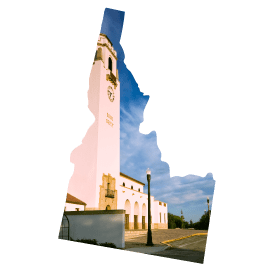Secondary Teacher Preparation in Science:
Idaho
Delivering Well Prepared Teachers Policy
Analysis of Idaho's policies
Idaho offers secondary science teachers a Natural Science endorsement, which appears to be the equivalent of the general science endorsement found in other states. Although the state requires an initial endorsement in biological science, physical science, physics, chemistry, earth science, geology, or agriculture science and technology, candidates then only need to earn an additional 24 semester credit hours in the remaining areas of science. They must also pass the Praxis II "General Science" test. Teachers with this license are not limited to teaching general science but rather can teach any of the topical areas.
Idaho also offers a Physical Science endorsement, which requires 20 semester credit hours in the area of physical science to include a minimum of eight credit hours in both chemistry and physics. Candidates must pass the Praxis II "Physical Science" test, which combines both chemistry and physics.
Middle school science teachers in Idaho may teach on a generalist K-8 license. A "Ninth Grade Endorsement" is available for elementary teachers who complete the requirements for a subject-area endorsement; this allows teachers to teach that subject through grade 9. Elementary teachers seeking this endorsement are required to pass the Praxis II "Middle School Science" test.
Recommendations for Idaho
Require secondary science teachers to pass tests of content knowledge for each science discipline they intend to teach.
States that allow general science certifications or combination licenses across multiple science disciplines—and only require a general knowledge science exam—are not ensuring that these secondary teachers possess adequate subject-specific content knowledge. Idaho's required general assessment combines subject areas (e.g., biology, chemistry, physics) and does not report separate scores for each subject area. Therefore, if a teacher is initially endorsed in earth science, she could answer many—perhaps all—chemistry questions, for example, incorrectly, yet still be licensed to teach chemistry to high school students.
Require middle school science teachers to pass a test of content knowledge that ensures sufficient knowledge of science.
State response to our analysis
Idaho recognized the factual accuracy of this analysis.
Select another topic
Delivering Well Prepared Teachers
- Admission into Preparation Programs
- Elementary Teacher Preparation
- Elementary Teacher Preparation in Reading Instruction
- Elementary Teacher Preparation in Mathematics
- Middle School Teacher Preparation
- Secondary Teacher Preparation
- Secondary Teacher Preparation in Science
- Secondary Teacher Preparation in Social Studies
- Special Education Teacher Preparation
- Assessing Professional Knowledge
- Student Teaching
- Teacher Preparation Program Accountability
Expanding the Pool of Teachers
Identifying Effective Teachers
- State Data Systems
- Evaluation of Effectiveness
- Frequency of Evaluations
- Tenure
- Licensure Advancement
- Equitable Distribution

